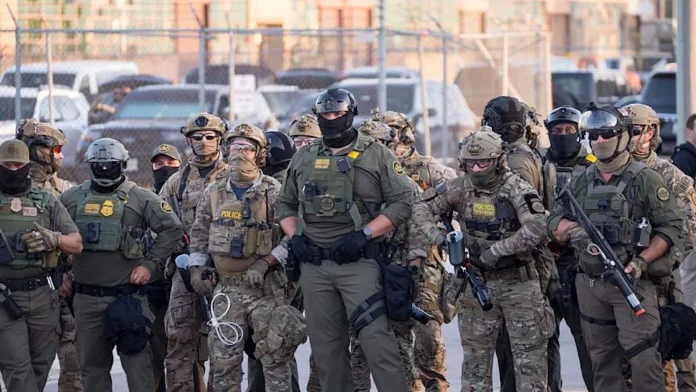Controversial Military Deployment Follows Immigration Enforcement Confrontation
President Donald Trump has greenlit the mobilization of 300 National Guard troops in Chicago, citing escalating criminal activity in the nation’s third-largest city. The authorization follows a volatile incident involving immigration enforcement officials and demonstrators that resulted in gunfire.
Shooting Incident Precedes Troop Authorization
The deployment order came mere hours after federal immigration agents reported a confrontation with protesters in the Democratic-controlled metropolis. According to authorities, a female protester allegedly participated in ramming vehicles into law enforcement cars and was subsequently shot when officers discovered she was carrying a firearm.
Department of Homeland Security assistant secretary Tricia McLaughlin provided details of the Saturday incident, stating that agents found themselves blocked and unable to maneuver their vehicles. “One of the drivers who rammed the law enforcement vehicle was armed with a semi-automatic weapon,” McLaughlin explained in an official statement.
She continued: “Law enforcement was forced to deploy their weapons and fire defensive shots at an armed US citizen.” The woman reportedly drove herself to a medical facility following the shooting, though the severity of her injuries remains undisclosed.
State Leadership Condemns Federal Intervention

Illinois Governor JB Pritzker and other state and municipal officials have spent recent weeks denouncing Trump’s deployment strategies, characterizing them as executive overreach. Pritzker specifically accused the president of “attempting to manufacture a crisis” to justify military intervention in civilian matters.
The uncertainty surrounding whether troops have physically arrived in Chicago persists, though legal experts anticipate immediate court challenges should the deployment proceed.
Portland Court Blocks Similar Military Action
The Chicago authorization coincided with a federal judicial ruling in Portland, Oregon, where Judge Karin Immergut temporarily halted the administration’s plan to deploy 200 military personnel to that city.
Judge Immergut delivered sharp criticism of Trump’s characterization of Portland conditions, describing his statements as “untethered to the facts.” Her ruling determined the deployment violated constitutional provisions.
The judge emphasized that deploying military forces to suppress civil unrest without state consent “risked the sovereignty of that state and others,” while also escalating tensions and triggering increased demonstrations.
Immergut’s decision stated that the administration’s justifications “risk blurring the line between civil and military federal power – to the detriment of this nation.”
Pattern of Deployments Across Democratic Cities
Chicago joins a growing roster of predominantly Democrat-led metropolitan areas targeted for contentious troop deployments, including Washington, Los Angeles, Memphis, and Portland.
These mobilizations have generated significant legal and constitutional debate, as National Guard forces traditionally operate under gubernatorial authority, and legislation dating back over a century restricts federal military involvement in domestic civilian affairs.
Immigration Protests Intensify in Chicago
The Illinois city has experienced heightened protest activity surrounding immigration enforcement operations, with many demonstrations concentrated outside US Immigration and Customs Enforcement facilities.
White House spokeswoman Abigail Jackson defended the authorization, stating: “Amidst ongoing violent riots and lawlessness, that local leaders like [Gov] Pritzker have refused to step in to quell, President Trump has authorized 300 national guardsmen to protect federal officers and assets.”
She added: “President Trump will not turn a blind eye to the lawlessness plaguing American cities.”
Trump’s Vision for Urban Military Operations
Earlier this week, the president addressed senior military commanders regarding his ongoing urban deployment strategy. He outlined his intention to utilize American cities as “training grounds” for military personnel, enabling them to combat what he termed the “enemy from within” and suppress civil disorder.
“They’re very unsafe places and we’re going to straighten them out one by one,” Trump declared when discussing Democratic-controlled cities like Chicago. He indicated that addressing these urban areas would constitute “a major part for some of the people in this room.”
Crime Statistics Present Complex Picture
Trump has maintained threats to deploy troops to Chicago for approximately one month, citing violent crime and shooting incidents as justification.
Statistical data reveals that violent crime in Chicago has declined substantially over the previous two years. According to the Council on Criminal Justice, homicide rates dropped by one-third between January and June compared to the corresponding period in the previous year.
However, Chicago’s overall crime levels remain considerably elevated compared to many other American cities. The Labor Day holiday weekend last month witnessed at least 58 shooting victims, including eight fatalities, highlighting the persistent public safety challenges facing the city.
Constitutional Questions Surround Military Deployments
The wave of National Guard deployments has sparked intense debate among constitutional scholars and legal experts regarding the appropriate boundaries between federal military authority and state sovereignty in managing domestic civil matters.
Critics argue that deploying military forces without state consent sets a concerning precedent that could fundamentally alter the balance of power between federal and state governments, potentially undermining the constitutional framework that has governed such relationships for over two centuries.
Uncertain Timeline for Implementation
As of now, confirmation regarding whether any National Guard personnel have been mobilized following the presidential authorization remains unavailable. Federal authorities have not provided specific timelines or detailed operational plans for the Chicago deployment.
Local advocacy groups and civil rights organizations have announced their intention to pursue immediate legal action should troops begin arriving in the city, setting the stage for what could become another protracted court battle over presidential authority and states’ rights.
The developing situation continues to underscore the deepening divisions between the federal administration and Democratic-led urban centers over immigration enforcement, public safety strategies, and the appropriate role of military forces in civilian contexts.

